(Web version in English & French & German & Italian & Portugese! Spanish coming soon!)
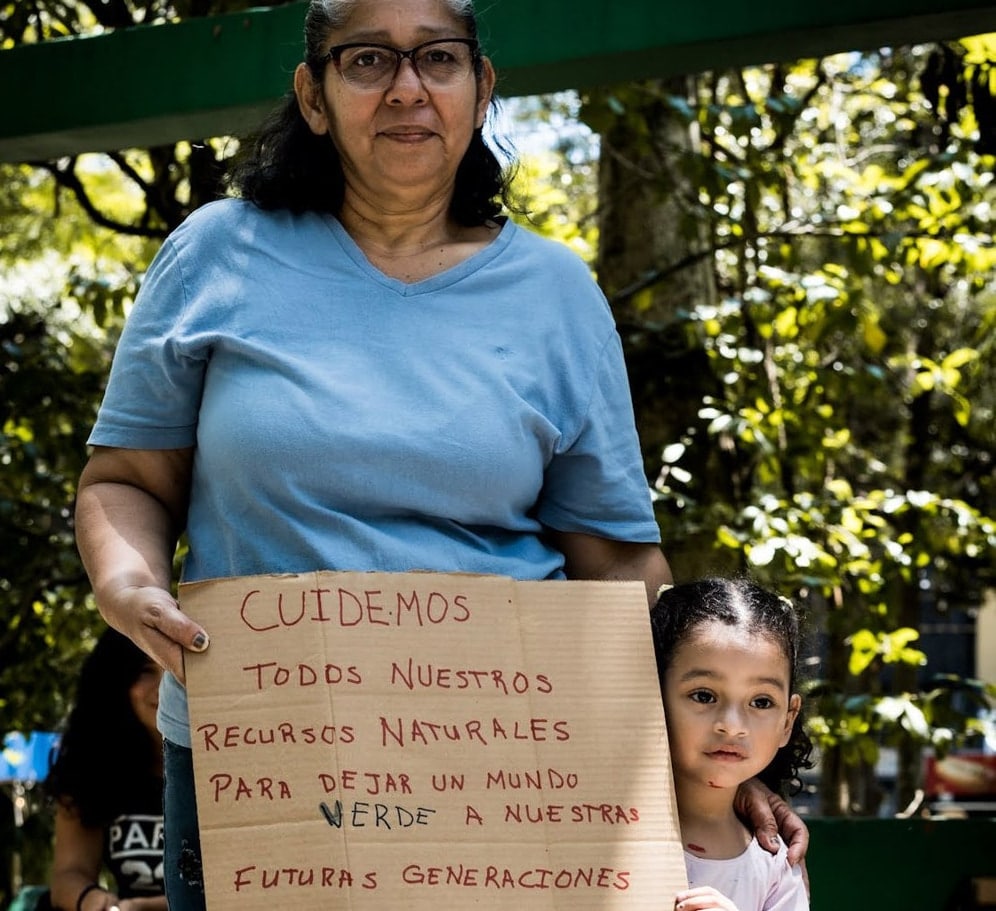 A mother and daughter in San José, Costa Rica. Sign: Let's take care of all our natural resources, so we leave a green world for our future generations.
A mother and daughter in San José, Costa Rica. Sign: Let's take care of all our natural resources, so we leave a green world for our future generations.
This issue: Global Mothers* Rebellion | XR Bangladesh | Dutch Arrest Record |
Dear rebel,
We’re leaving our children a world that is far more dangerous and unequal than the one we inherited.
If carbon emissions continue at their current rate, a child born today will live on a planet where between a third and a half of the global population cannot flourish because of extreme temperatures.
We’re already getting glimpses of this nightmare future - a world where Indian construction workers feel like they work in ovens, where wildfires rage right across Canada and force Americans indoors to stare at orange skies.
With the recent arrival of El Niño, a global weather pattern that will further heat the planet, these glimpses can only worsen.
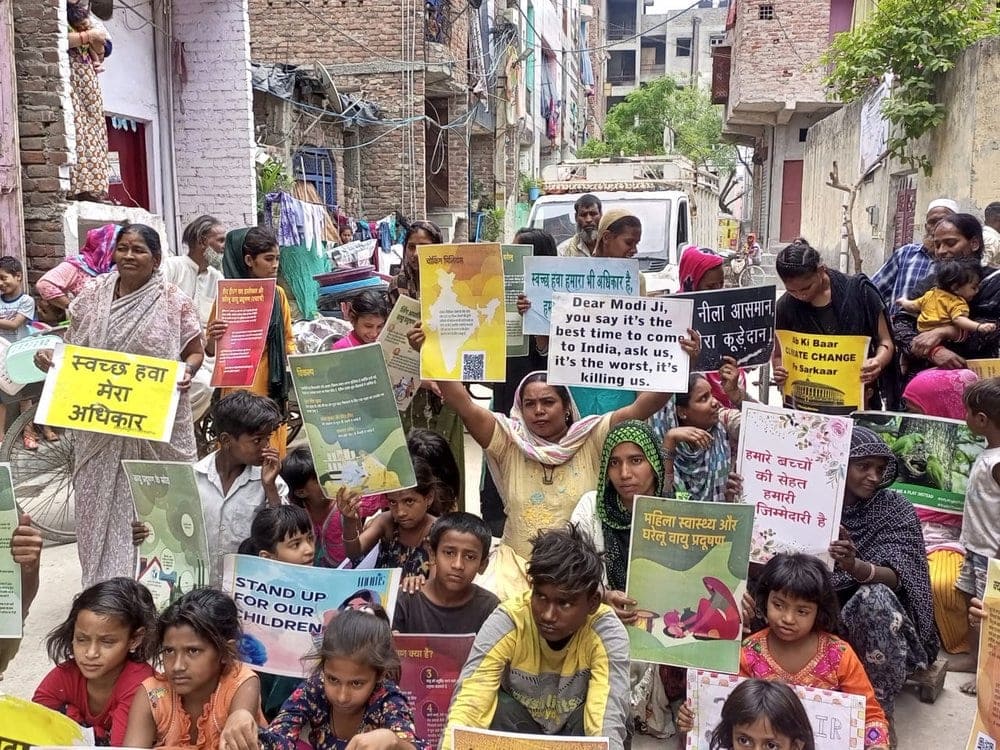 Mothers and children rally in New Delhi, India for the global Mothers* Rebellion.
Mothers and children rally in New Delhi, India for the global Mothers* Rebellion.
But rebel mothers in 62 cities across the world refused to look away. They occupied public spaces, they shared their fears about the unfolding horror, and they promised to do everything they could to protect all children from it. Find out more about this very global Mothers* Rebellion in Action Highlights.
There you can also read about the exciting resurgence of XR Bangladesh, the incredible number of arrests that resulted from a motorway blockade in the Netherlands, and how an activist alliance brought rock-n-roll rebellion to the streets of Australia.
For Humans of XR, we talk to a rebel in Sweden who was forced to flee her home in Iran because of her political activism. And in a Special Report, we look at what comes next for XR UK after its bold, beautiful but disregarded Big One rebellion.
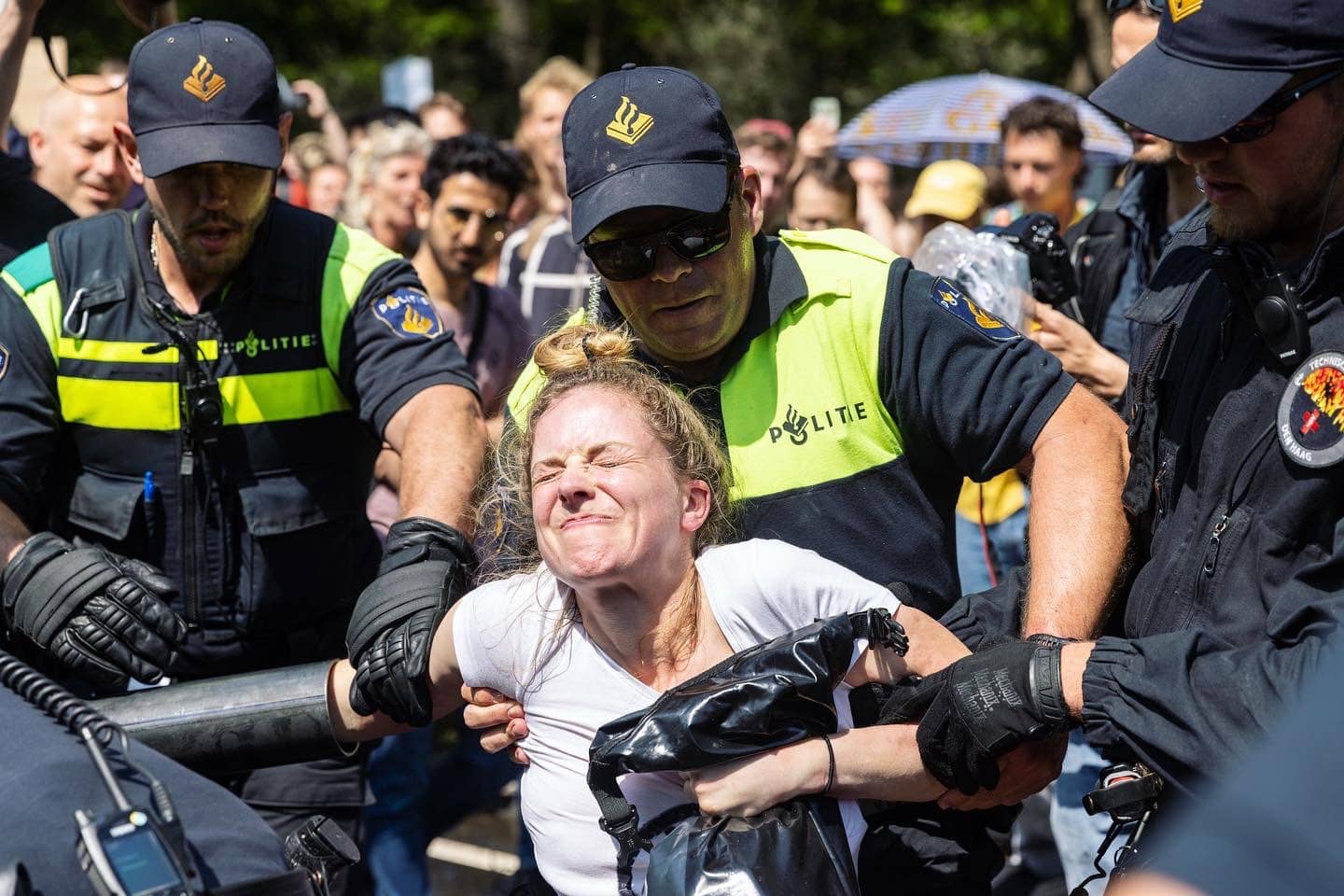 Dutch police arrested a record number of rebels blocking a motorway, some violently.
Dutch police arrested a record number of rebels blocking a motorway, some violently.
There is still time to ensure we live in a world where mass heatstroke, apocalyptic wildfires, and orange skies are the exception rather than the norm.
Every 0.1 °C of warming will expose another 140 million people to damaging levels of heat. We must follow the example of the rebel mothers, and do everything we can to keep our world as hospitable to future life as possible.
This newsletter is brought to you by XR Global Support, a worldwide network of rebels who help our movement grow. We need money to continue this crucial work.
Contents
-
Action Highlights: Global Mothers* Rebellion, XR Bangladesh vs G7, XR Netherlands A12 Blockade, XR Australia’s Occupy For Climate
-
Action Round-up: UK, Ecuador, Italy, Tanzania, Switzerland, Germany, Spain, France, Sweden, DRC, Wales.
-
Special Report: What’s Next For XR UK?
-
Humans of XR: Sima, Sweden
Action Highlights
A Mother’s Love & Rage
13 MAY | India, Uganda, DRC, Zimbabwe, Zambia, Nigeria, South Africa, Costa Rica, Mexico, Argentina, USA, Australia, Germany, UK, Sweden, Norway, Finland, Poland, Spain, Portugal
The mothers of the world won’t look away, they refuse to give up, and they will do everything they can to get climate justice for their children.
That was the message delivered by rebel mothers in 62 cities across 20 countries the day before much of the world celebrated Mother’s Day. They sat in outward-facing circles in public spaces, holding signs with the names of their children, and were joined by grandmothers, aunties, nieces, sisters, children, and other allies.
Each circle was different—some quiet and contemplative, some including dance and song, others holding climate story-times for children or pram parades!
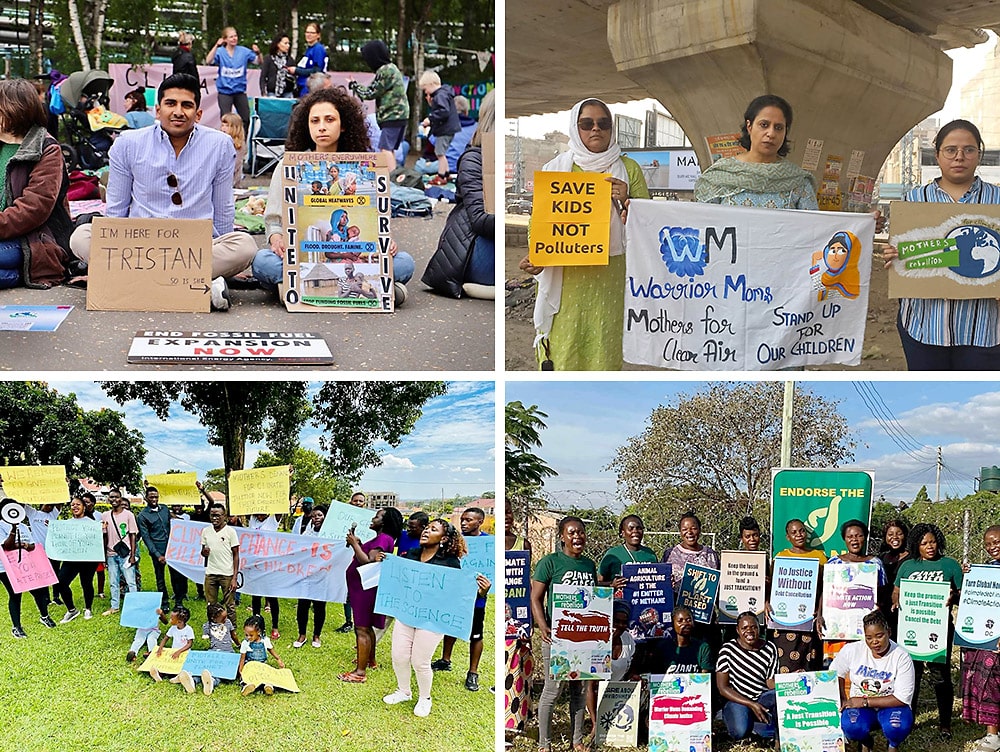 Rebel mothers and their allies unite in (clockwise from top left) London, UK, Ludhiana, India, Kampala, Uganda, and Lusaka, Zambia.
Rebel mothers and their allies unite in (clockwise from top left) London, UK, Ludhiana, India, Kampala, Uganda, and Lusaka, Zambia.
The global wave of actions was organised by Mothers* Rebellion, the * signifying inclusivity for mothers, other caregivers, and their allies. The campaign harnessed all their power to highlight how the climate crisis is a child rights issue, and how those least responsible for the crisis will be the most impacted.
A rebel mother in Australia said, “Women have always used their position as mothers to influence society. Mother’s Day began as an anti-war movement."
Another in Uganda added, “We are here to remind people that they can and must respond to climate change now, and that every person has to fight it, not just politicians.”
A father in India saluted the mothers taking part for “spreading awareness to save Mother Earth and providing a healthy environment for upcoming generations!”
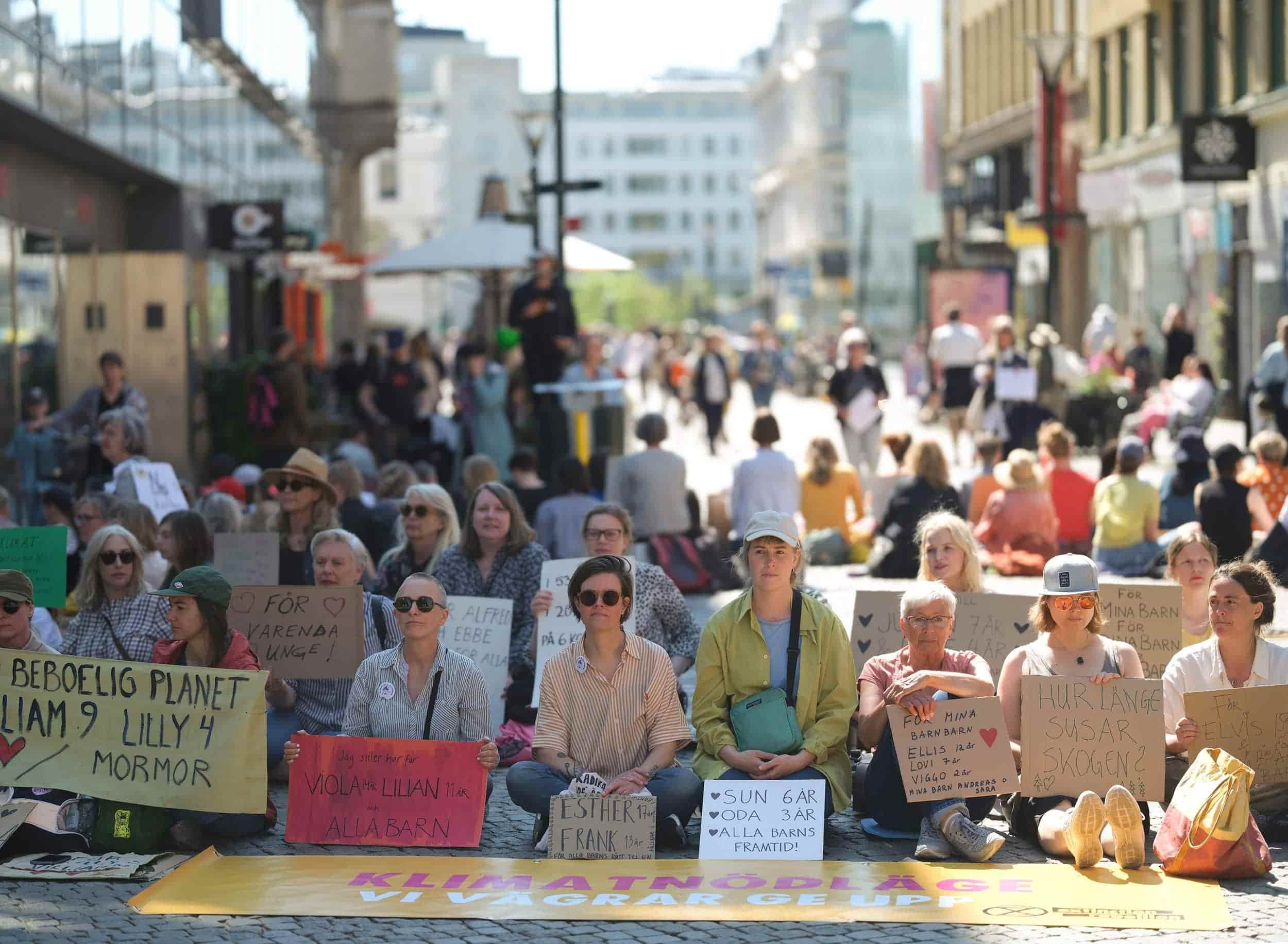 A circle in Malmö, Sweden, where the rebel mother movement first began.
A circle in Malmö, Sweden, where the rebel mother movement first began.
Mothers* Rebellion was founded in 2022 by members of XR Los Angeles. They joined forces with rebel mums in Sweden who had already started organising locally - more than 3,000 mothers have since sat in circles in 20 Swedish cities.
Earlier this year, women in Germany, Sweden, the US, Uganda and Zambia got together to start planning this debut global Mothers' Rebellion. After such a broad and brilliant campaign, plans are already underway for the next one.
Join Mothers* Rebellion and follow their campaign on Instagram.
G7 Leaders: Stop Financing Fossil Fuels
19 MAY | Dhaka, Bangladesh
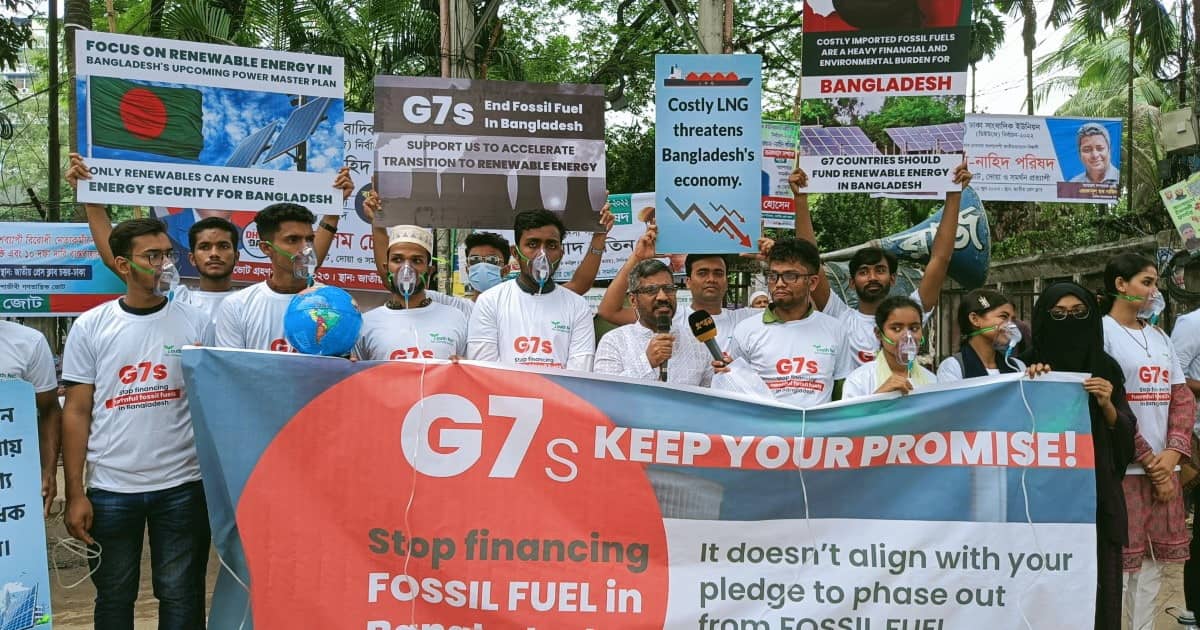 Bangladeshi rebels and allies demand that the G7 stop financing fossil fuels.
Bangladeshi rebels and allies demand that the G7 stop financing fossil fuels.
Holding banners, placards and loudspeakers, more than 100 activists gathered outside Bangladesh’s National Press Club to condemn world governments for their continuing extraction and burning of fossil fuels.
Rebels from the recently re-formed XR Bangladesh joined local members of Fridays for Future and YouthNet for Climate Justice to demand real action from the G7 nations, whose leaders were meeting in Hiroshima, Japan, for their annual summit.
The activist alliance formed a human-chain around the press club, with some wearing oxygen masks to highlight the horrendous air pollution created by fossil fuels. Dhaka has been ranked one of the most air-polluted cities in the world, and Bangladesh one of the most polluted countries, thanks in large part to the continued use of coal and huge emissions from road traffic and construction.
Other activists spelled out ‘Don’t Gas Asia’ in giant letters to highlight how Asian nations, including Bangladesh, import ever more Liquid Natural Gas (LNG). The Police did not intervene, and there were no arrests.
 An activist wearing an oxygen mask demands renewable energy in Bangladesh.
An activist wearing an oxygen mask demands renewable energy in Bangladesh.
Bangladesh is one of the most at-risk countries in the world from the consequences of climate breakdown, with an impoverished population left at even greater risk by centuries of colonial capitalism and exploitation by the West.
The protestors sent a clear message that Bangladesh’s government – and, even more so, the world’s rich nations – must immediately begin a just transition towards clean, renewable energy.
XR Bangladesh and YouthNet are continuing to expand their activist alliance, recently welcoming groups dedicated to trans rights and disability justice. They are also educating people – particularly young people – about the climate crisis, and how both scientific information and indigenous knowledge should fuel climate action.
Follow XR Bangladesh on Twitter and Instagram.
1500+ Arrests at Motorway Blockade
27 MAY | The Hague, Netherlands
More than 1500 rebels were arrested, some violently, during a peaceful motorway blockade in The Hague. The action set a new record for arrests in the city (and probably any city), and seemed to completely overwhelm the Dutch authorities.
“Our justice system is flooded and many in the judiciary are saying they don’t have the capacity (to prosecute). And also it’s pointless,” said a Dutch rebel overseeing the action.
 Thousands turned out to blockade the A12 motorway that runs through The Hague.
Thousands turned out to blockade the A12 motorway that runs through The Hague.
Announced months in advance, the blockade attracted more than 6000 people, including support from 125 NGOs, 100 Scientists from Scientist Rebellion, and an orchestra of 80 musicians playing Beethoven’s Seventh Symphony. They were met with aggressive police tactics. Water cannons were deployed after only 15 minutes, but the rebels were not deterred.
While most of those arrested were brought to a nearby football stadium and released almost immediately, around 40 remained in police custody for the whole day without food or water. They were held in tiny cells inside a police bus, where they were aggressively interrogated.
One rebel was accused of biting a police officer and held for three days, but there was no proof of any violence, and they were fully acquitted a week later.
 The A12 Orchestra kept the blockade civilised, despite police violence. Photo: James Petermeier.
The A12 Orchestra kept the blockade civilised, despite police violence. Photo: James Petermeier.
This is the seventh time XR has blockaded the same motorway, the A12, to demand that the government stop subsiding the fossil fuel industry. When police preemptively arrested rebels in their homes before a similar A12 blockade in January, it caused a national outcry and an outpouring of support from civil society groups.
XR Netherlands has been growing ever since, and action trainings are packed with new recruits. Our rebel source made clear though that they are not just fighting for their own future; “We are fighting for people right now who are getting hurt in terrible ways. 43,000 people died from drought in Somalia last year.”
“Your country might be very different (when it comes to risking arrest), so we just want to encourage everyone to do what they can wherever they are.”
Follow the A12 Blockade campaign on Facebook and Twitter.
Aussie Rebels Rock Melbourne
25 - 27 MAY | Melbourne/Naarm, Australia
The Australian government has an array of eco-experts at its disposal - from the Indigenous people who have sustained the land for millennia to the scientists who have spent decades patiently sounding the climate alarm.
But they choose not to listen. So, XR Victoria organised a three-day occupation of central Melbourne (the Indigenous name of which is Naarm). A base camp was erected in the gardens near Victoria's Parliament House, which staged workshops, talks, a much-needed kitchen, and was also the starting point for a stream of actions.
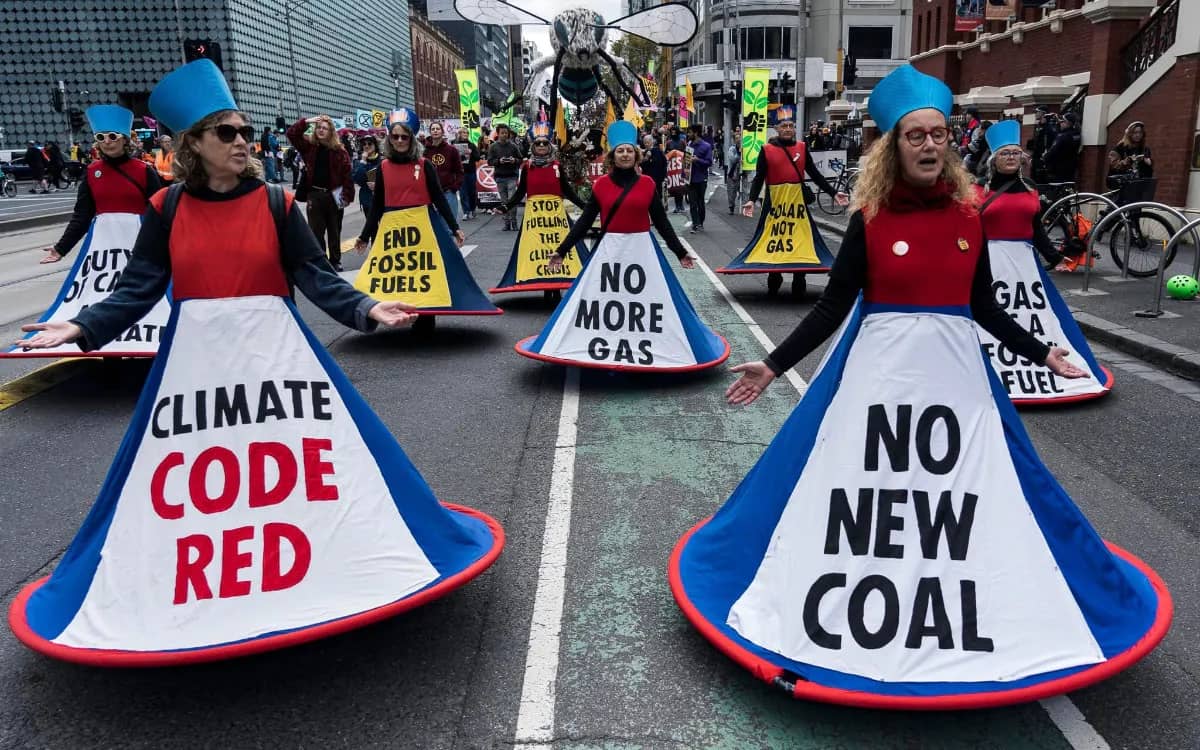 Miss Beehave (background) and XR Sybils (sybils were women believed to possess prophetic powers in Ancient Greece) take part in the Slow March.
Miss Beehave (background) and XR Sybils (sybils were women believed to possess prophetic powers in Ancient Greece) take part in the Slow March.
The trickle started with a combined rebel action involving Scientist Rebellion, Move Beyond Coal and School Strike 4 Climate, with the activists bringing scientific evidence to the National Australia Bank and demanding an end to fossil fuel funding.
The next day was National Sorry Day, when Australians remember the mistreatment of Indigenous children who were forcibly “assimilated” into white Australian culture. In respect, rebels held back from disruptive actions until the evening, when a pop-up protest articulated their vision for a better world, hundreds of cyclists flooded the streets for a slow mass bike ride, and an Oz Rock Block party shook the tarmac.
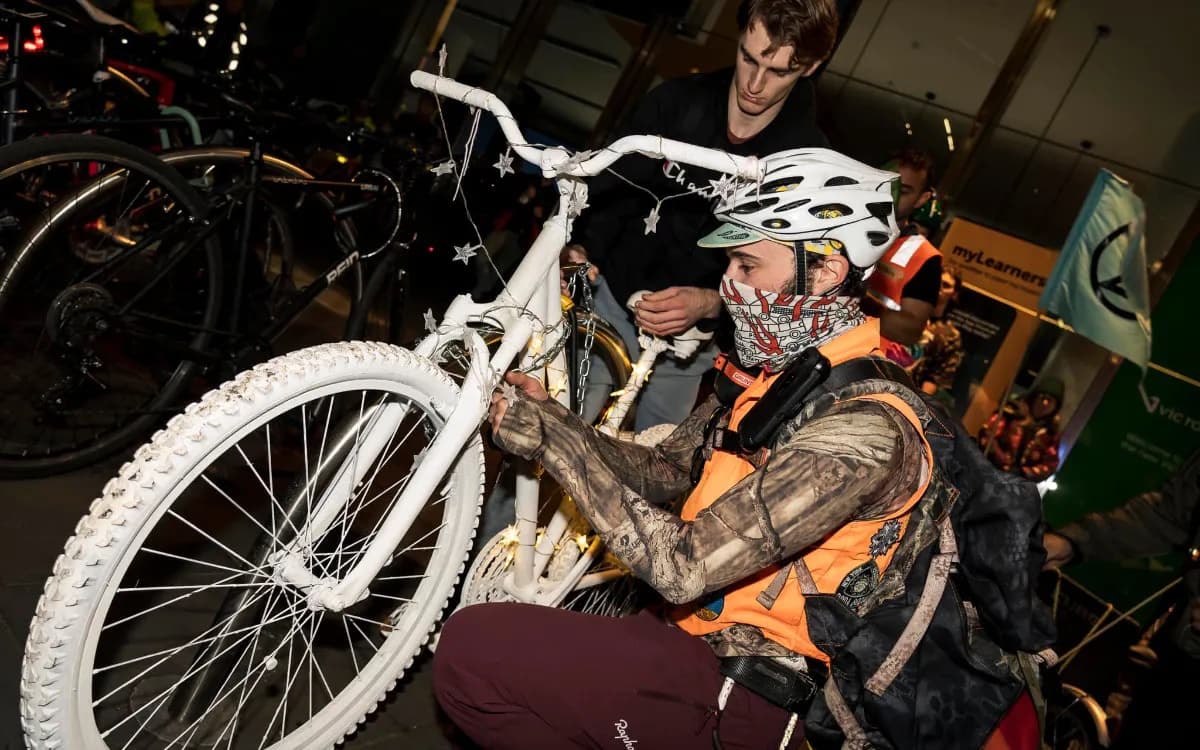 A ghost bike commemorating dead cyclists was installed during the slow bike ride.
A ghost bike commemorating dead cyclists was installed during the slow bike ride.
A flotilla of canoes on the Yarra river (Indigenous name, Birrarung) and a very slow march through the city centre were the highlights of the final day, with the latter action causing over two and a half hours of disruption. Blinky the giant burnt koala, Miss Beehave the giant bee, the XR Sybils, and the Red Brigade were all in attendance, as were hundreds of rebels and supporters.
To those annoyed by the delays to their commute, and against the disruptive tactics, XR Victoria had this to say; “At least we are doing something. If you have better ways to get the urgent change we need, we are happy to hear them."
Follow XR Victoria on Facebook.
Action Round-up
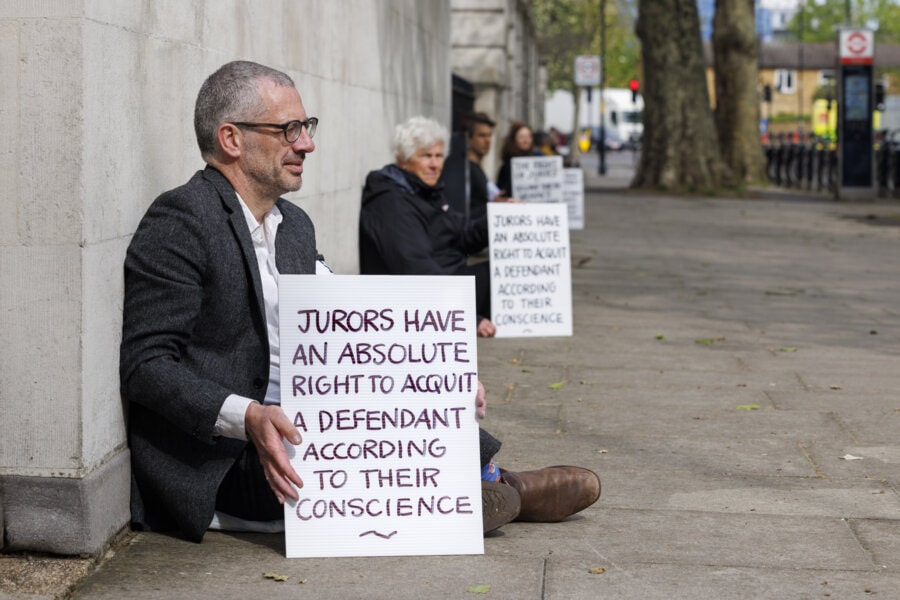 15 MAY | London, UK: 24 rebels protest outside a court after a judge prevented climate activists on trial for disruption from referring to climate change in their defence. When a lone rebel protested the ruling outside the court, the judge ordered her arrest. In solidarity, the rebel group, including an Olympic gold medallist, a priest, and a retired police sergeant, repeated the protest. The judge has called for them to be prosecuted. In more bizarre UK court news, two rebel drummers were accused of causing £28k of damage to oil company Schlumberger after they banged the metal shutters of one of its buildings with… their wooden drumsticks. They were later cleared.
15 MAY | London, UK: 24 rebels protest outside a court after a judge prevented climate activists on trial for disruption from referring to climate change in their defence. When a lone rebel protested the ruling outside the court, the judge ordered her arrest. In solidarity, the rebel group, including an Olympic gold medallist, a priest, and a retired police sergeant, repeated the protest. The judge has called for them to be prosecuted. In more bizarre UK court news, two rebel drummers were accused of causing £28k of damage to oil company Schlumberger after they banged the metal shutters of one of its buildings with… their wooden drumsticks. They were later cleared.
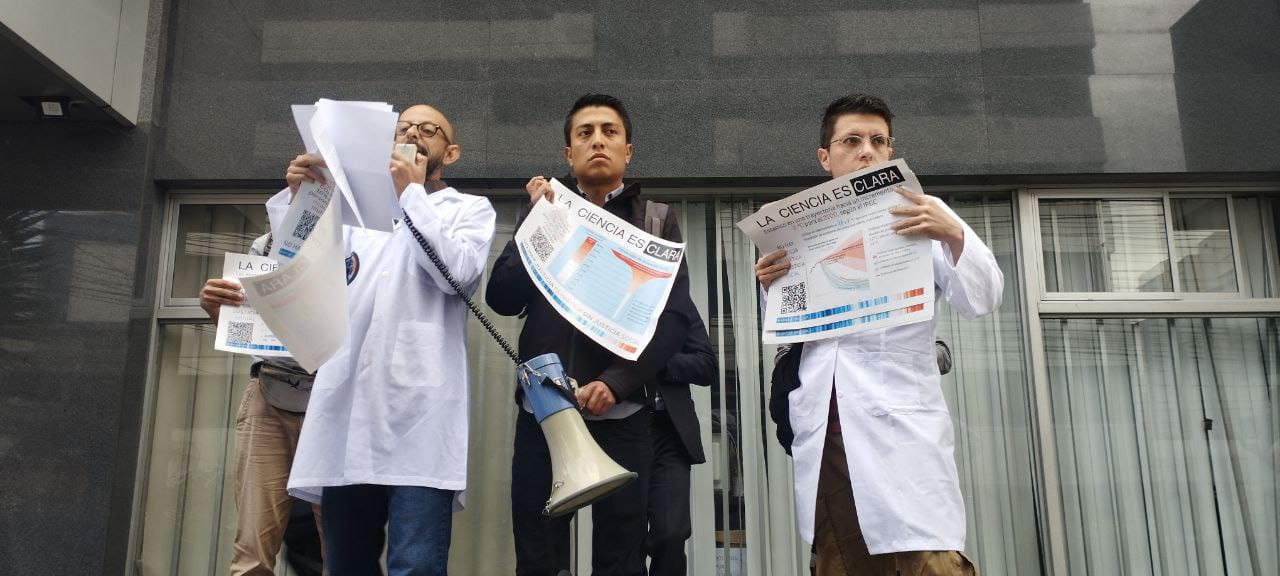 20 MAY | Ecuador: Members of Scientist Rebellion paste scientific papers onto the offices of the national oil company PetroEcuador. They also condemned Spanish oil company Repsol for spilling 11,900 barrels off the Peruvian coast, and paid tribute to an indigenous activist who fought to protect the Ecuadorian Amazon jungle from PetroEcuador and was assassinated by hitmen in February.
20 MAY | Ecuador: Members of Scientist Rebellion paste scientific papers onto the offices of the national oil company PetroEcuador. They also condemned Spanish oil company Repsol for spilling 11,900 barrels off the Peruvian coast, and paid tribute to an indigenous activist who fought to protect the Ecuadorian Amazon jungle from PetroEcuador and was assassinated by hitmen in February.
 21 MAY | Rome, Italy: Last Generation activists dye the Trevi Fountain black as they demand an immediate end to fossil fuels subsidies. The action took place after floods in the north of the country killed 14 and displaced 36,000 people.
21 MAY | Rome, Italy: Last Generation activists dye the Trevi Fountain black as they demand an immediate end to fossil fuels subsidies. The action took place after floods in the north of the country killed 14 and displaced 36,000 people.
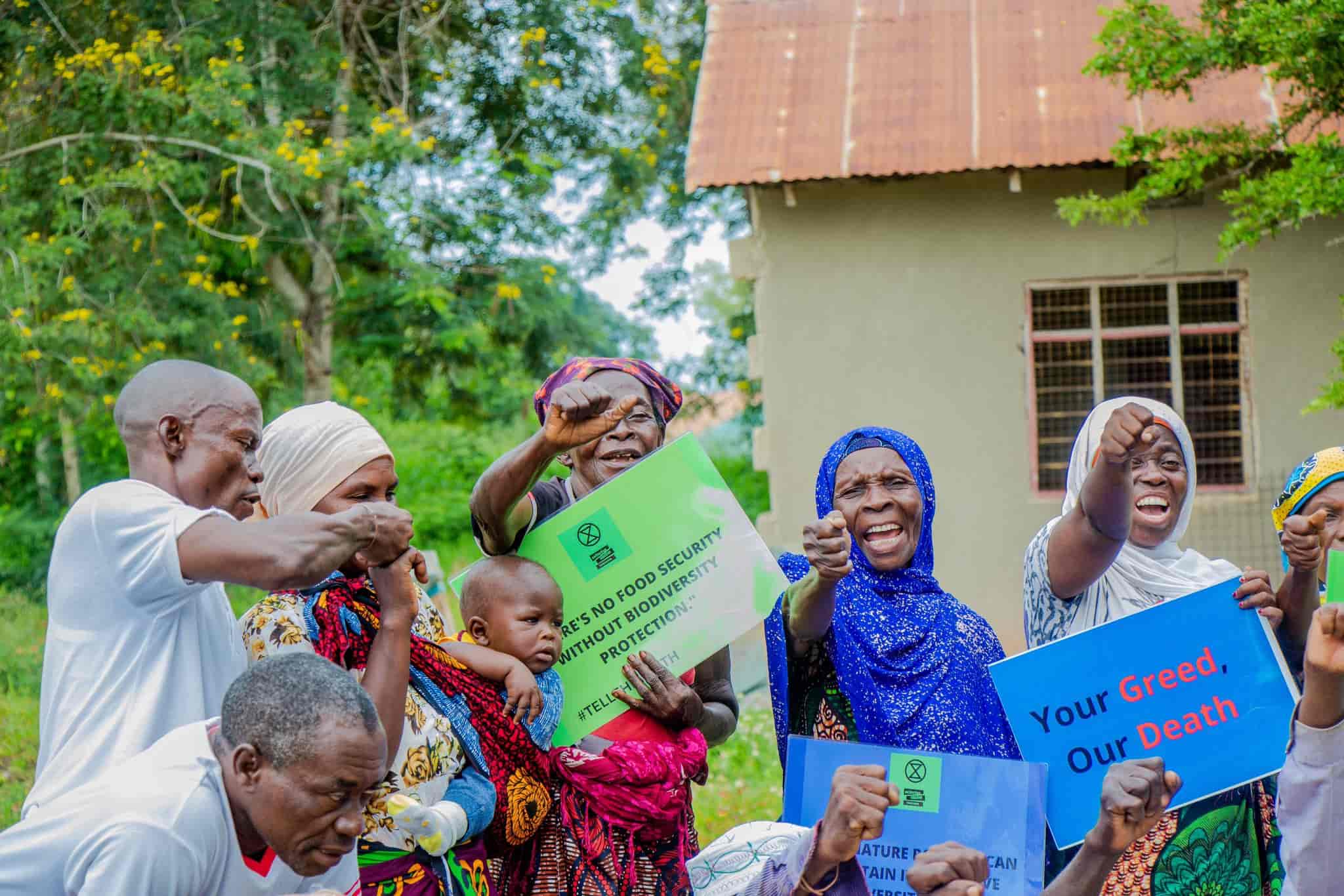 22 MAY | Pwani, Tanzania: Rebels commemorate Biodiversity Day by planting fruit trees with local communities and farmers in the coastal Pwani region.
22 MAY | Pwani, Tanzania: Rebels commemorate Biodiversity Day by planting fruit trees with local communities and farmers in the coastal Pwani region.
 23 MAY | Geneva, Switzerland: Activists from a multinational alliance of groups including XR, Stay Grounded, Scientist Rebellion and Greenpeace infiltrate EBACE, the biggest private jet sales expo in Europe! Some activists were pepper-sprayed and injured by police as they chained themselves to the jets. After more than 24 hours, 102 climate activists were released from police custody. Stay Grounded have already launched a new campaign against private jets.
23 MAY | Geneva, Switzerland: Activists from a multinational alliance of groups including XR, Stay Grounded, Scientist Rebellion and Greenpeace infiltrate EBACE, the biggest private jet sales expo in Europe! Some activists were pepper-sprayed and injured by police as they chained themselves to the jets. After more than 24 hours, 102 climate activists were released from police custody. Stay Grounded have already launched a new campaign against private jets.
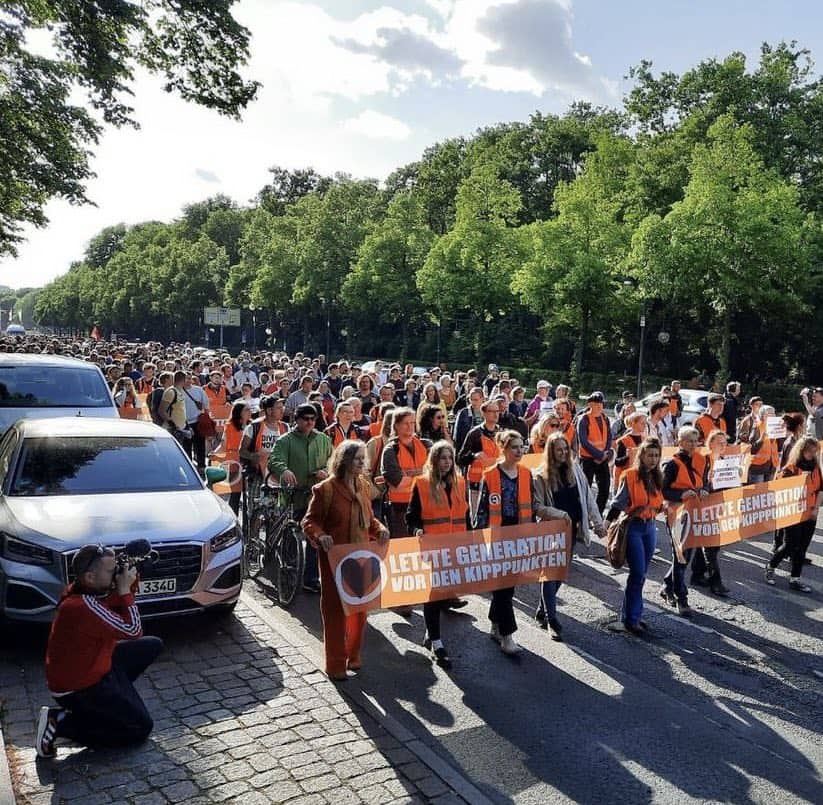 24 MAY | Germany: After nationwide police raids on the homes of Letzte Generation (Last Generation) coordinators, and the shutting down of their website, solidarity marches were launched across the country, with many thousands taking part.
24 MAY | Germany: After nationwide police raids on the homes of Letzte Generation (Last Generation) coordinators, and the shutting down of their website, solidarity marches were launched across the country, with many thousands taking part.
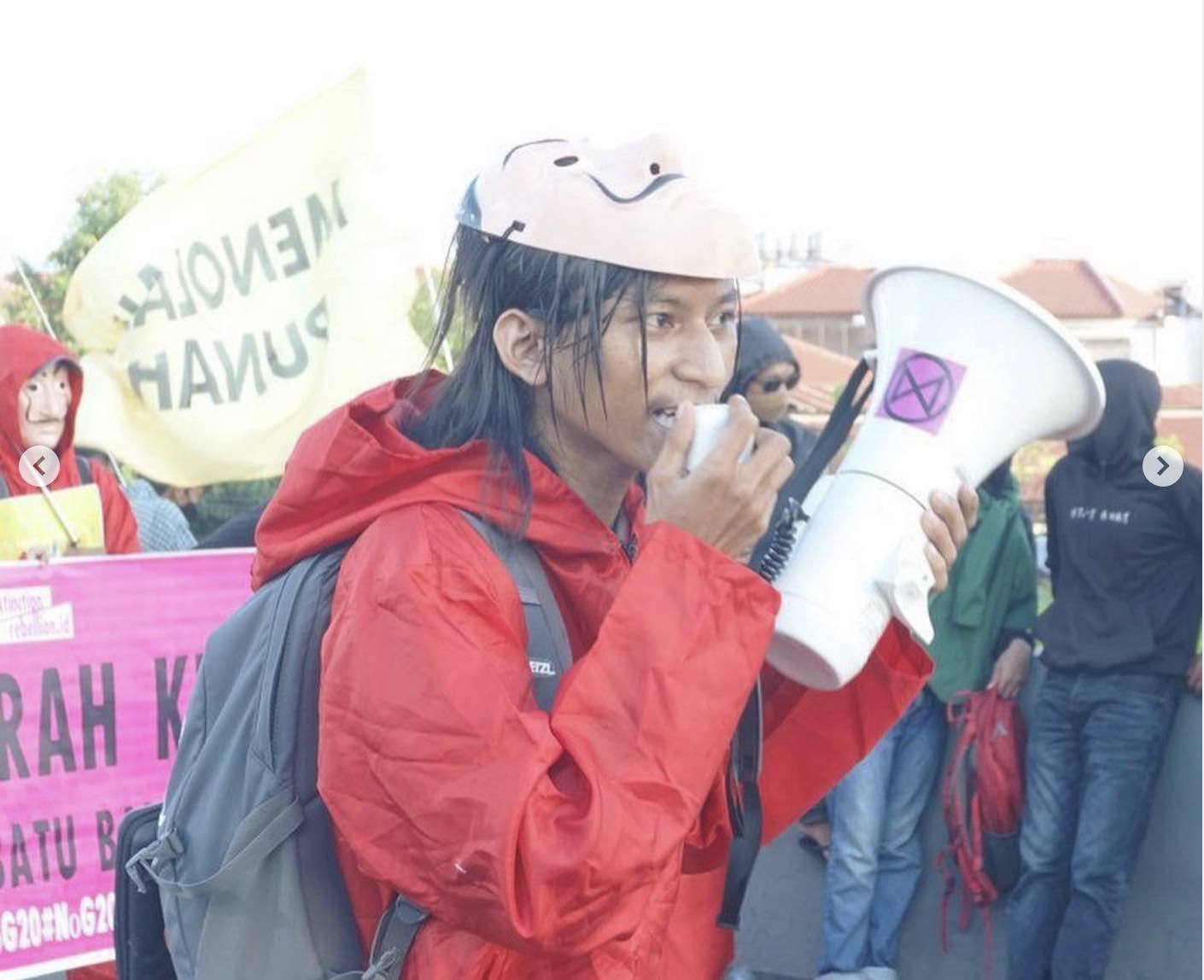 25 MAY | Bilbao, Spain: A rebel and D4C activist from Indonesia confronts a World Bank representative at Innovate4Climate, the institution’s annual conference on climate finance, carbon markets and investment (aka greenwashing). The activist recently made this moving video about his continually flooded local neighbourhood in Makassar.
25 MAY | Bilbao, Spain: A rebel and D4C activist from Indonesia confronts a World Bank representative at Innovate4Climate, the institution’s annual conference on climate finance, carbon markets and investment (aka greenwashing). The activist recently made this moving video about his continually flooded local neighbourhood in Makassar.
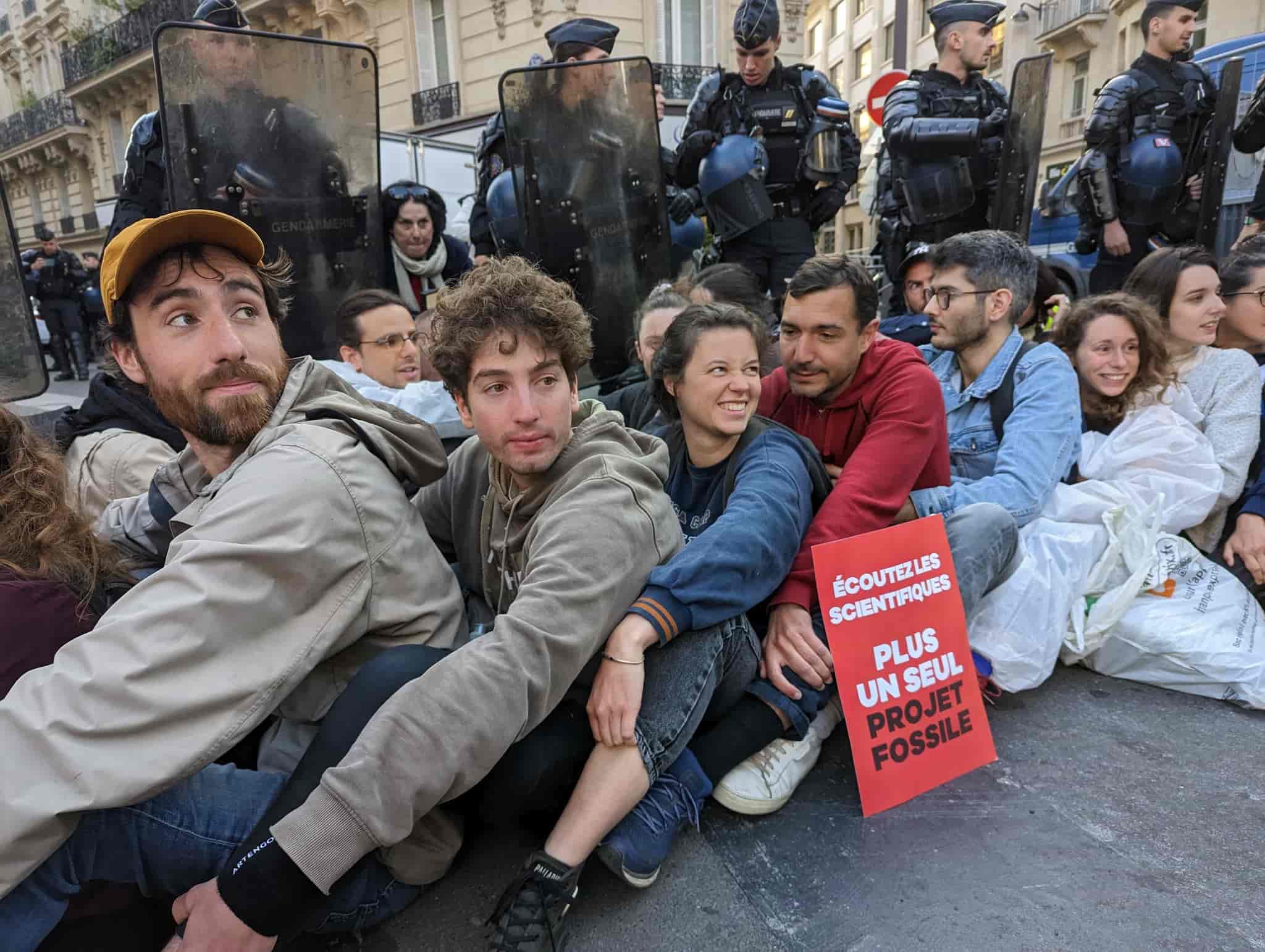 26 MAY | Paris, France: An alliance of activists from Scientist Rebellion, Greenpeace, Attac France, XR, and many more blockaded the annual shareholder meeting of fossil fuel giant Total. Police reacted violently, first blockading then beating and firing tear-gas at the peaceful protesters.
26 MAY | Paris, France: An alliance of activists from Scientist Rebellion, Greenpeace, Attac France, XR, and many more blockaded the annual shareholder meeting of fossil fuel giant Total. Police reacted violently, first blockading then beating and firing tear-gas at the peaceful protesters.
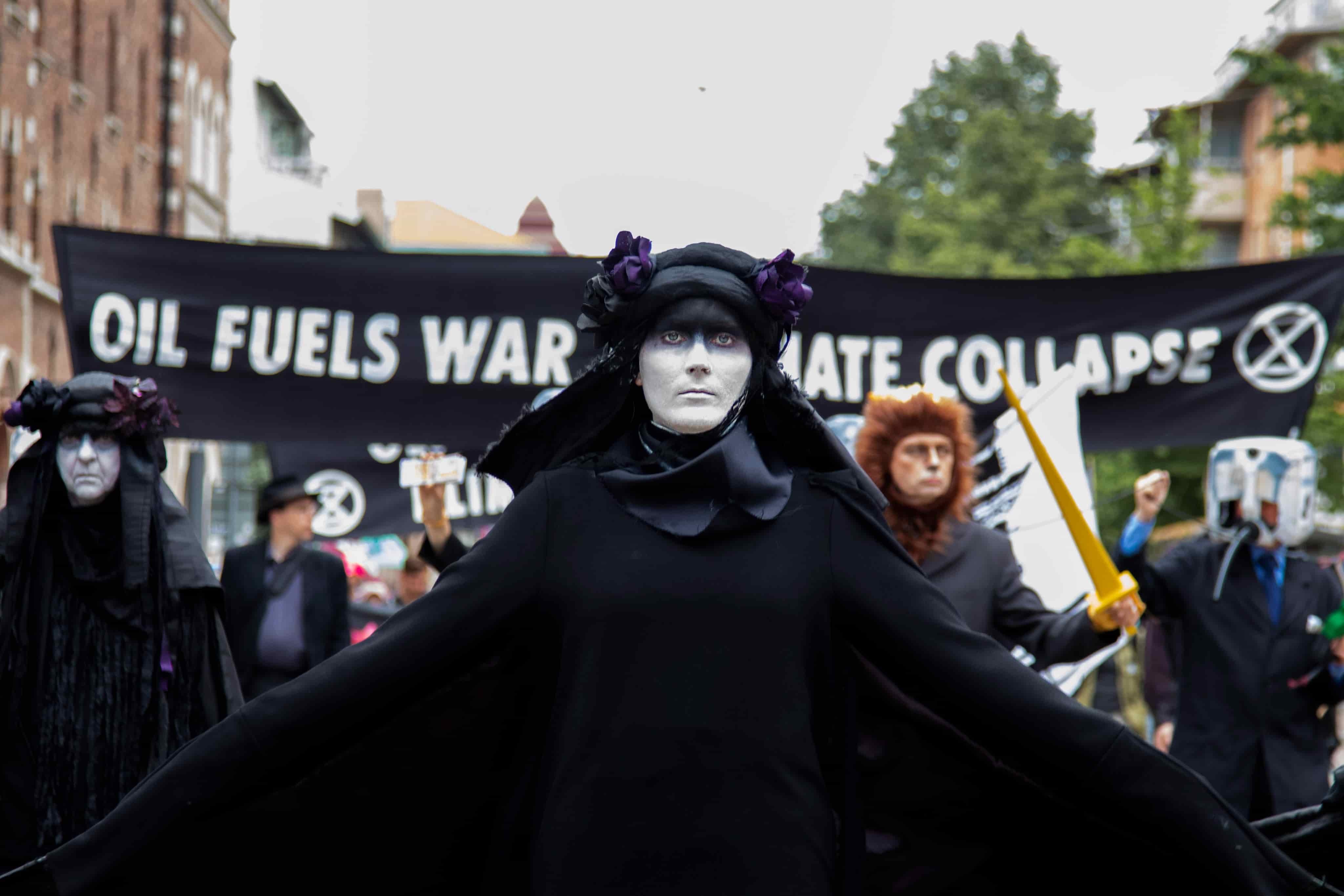 25 - 27 MAY | Gothenburg, Sweden: Rebels targeted the port and the politicians of Gothenburg during a three-day uprising. The coastal city’s port is a major hub for oil imports and oil refineries. Rebels occupied the City Hall reception, disrupted council meetings, blockaded the port itself, and the surrounding sea using kayaks. Two rebels managed to hang a 20 m banner from a giant new bridge linking the city to an island.
25 - 27 MAY | Gothenburg, Sweden: Rebels targeted the port and the politicians of Gothenburg during a three-day uprising. The coastal city’s port is a major hub for oil imports and oil refineries. Rebels occupied the City Hall reception, disrupted council meetings, blockaded the port itself, and the surrounding sea using kayaks. Two rebels managed to hang a 20 m banner from a giant new bridge linking the city to an island.
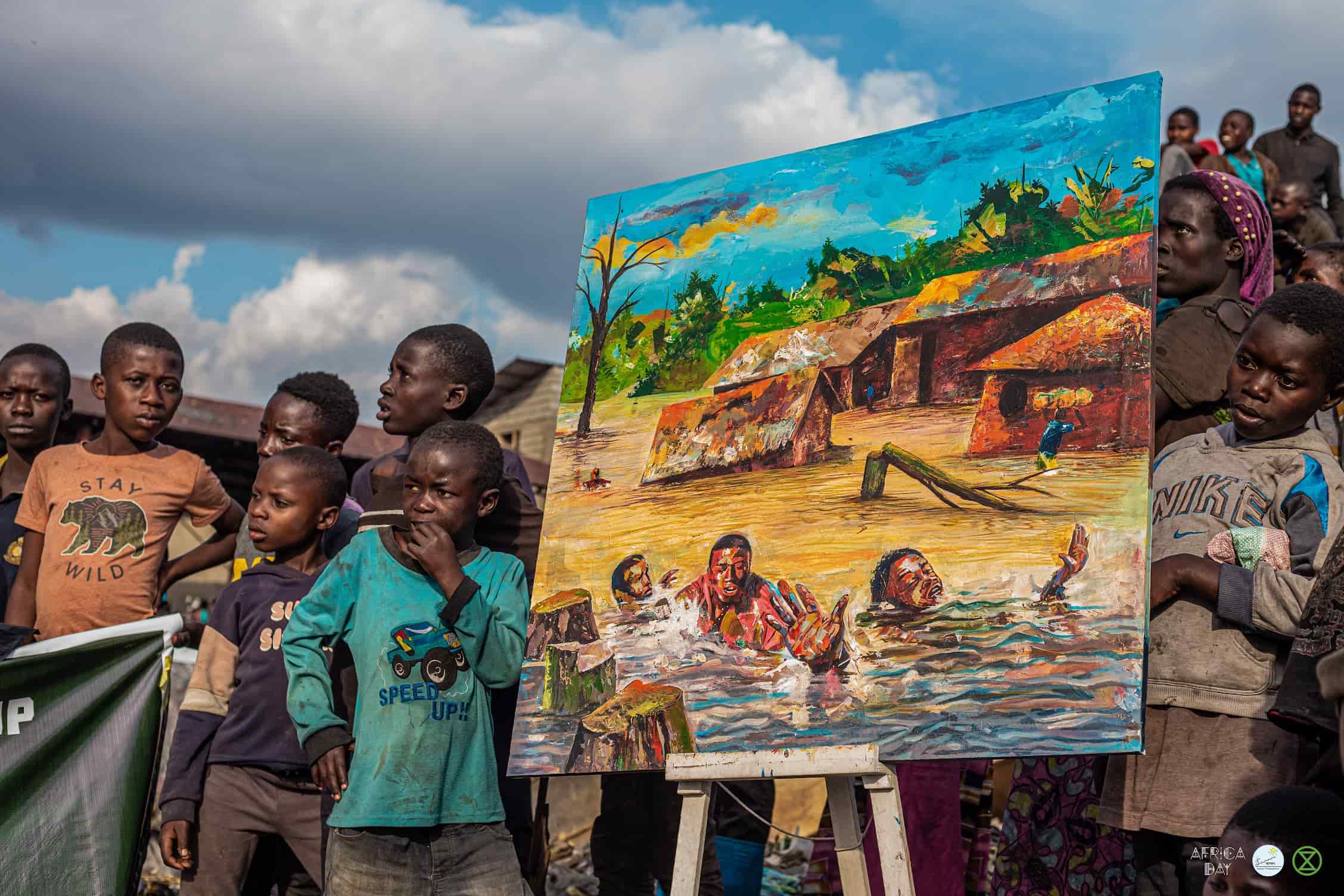 1 JUNE | Goma, DRC: Rebels mobilised in Kituku market and displayed artworks condemning fossil fuel exploitation in the region. Anglo-French oil company, Perenco recently bought 27 new oil blocks by Lake Albert and will export the oil using the EACOP pipeline. The east of DRC has been plunged into crisis by a series of landslides and severe floods in May. More than 500 have been killed and many more displaced.
1 JUNE | Goma, DRC: Rebels mobilised in Kituku market and displayed artworks condemning fossil fuel exploitation in the region. Anglo-French oil company, Perenco recently bought 27 new oil blocks by Lake Albert and will export the oil using the EACOP pipeline. The east of DRC has been plunged into crisis by a series of landslides and severe floods in May. More than 500 have been killed and many more displaced.
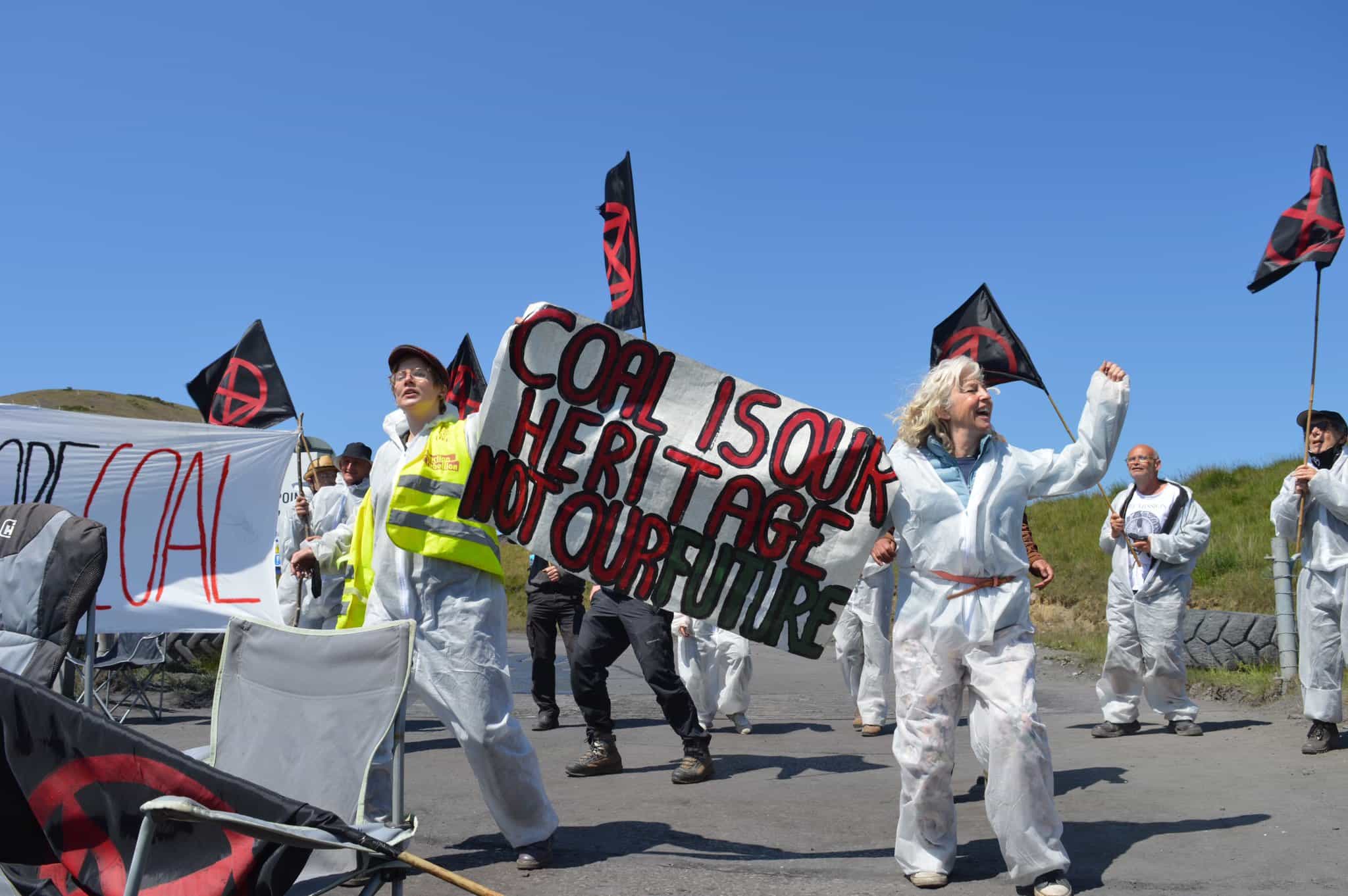 2 JUNE | Merthyr Tydfil, Wales: After witnessing weeks of illegal mining at the Ffos-y-Fran coal mine in South Wales, XR Cymru and friends blockaded it and forced it to close for the day. They demanded that the owners restore the land as promised, and help their workers get future-proof jobs.
2 JUNE | Merthyr Tydfil, Wales: After witnessing weeks of illegal mining at the Ffos-y-Fran coal mine in South Wales, XR Cymru and friends blockaded it and forced it to close for the day. They demanded that the owners restore the land as promised, and help their workers get future-proof jobs.
Special Report:
What’s Next For XR UK?
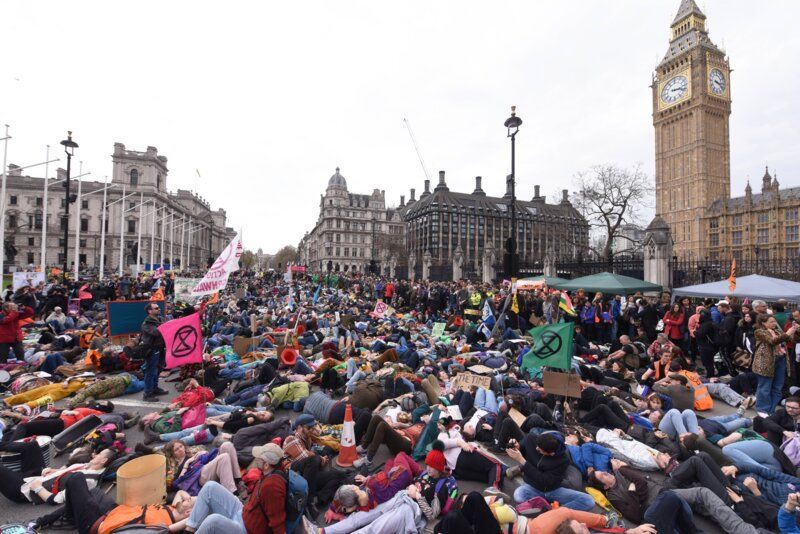 Rebels hold a die-in outside the UK Parliament in London during The Big One.
Rebels hold a die-in outside the UK Parliament in London during The Big One.
It’s been just over a month since 60,000 people gathered in London for XR UK’s Big One. Despite being potentially the biggest climate demonstration in UK history, you might well have missed it. The press coverage was virtually non-existent, and the event produced no noticeable change: The British government remains hell-bent on ecocide, its legislation increasingly draconian, its litany of scandals unrelenting.
Despite this silence — or, indeed, because of it — April 2023 could go down in history as a crucial moment for the UK climate movement. And one month on, XR UK’s big strategy reveal shows why.
XR’s large-scale London actions have always left behind contested narratives. Whether it’s the miracle of April 2019’s breakthrough, the missteps of October 2019, or the varied post-pandemic efforts at revival: Picking apart the movement’s highs and lows is a pastime relished by many insiders and no shortage of observers….
Read the rest of this article by heading over to Waging Nonviolence, a non-profit media platform providing reporting on and analysis of social movements.
Humans of XR:
Sima, Sweden
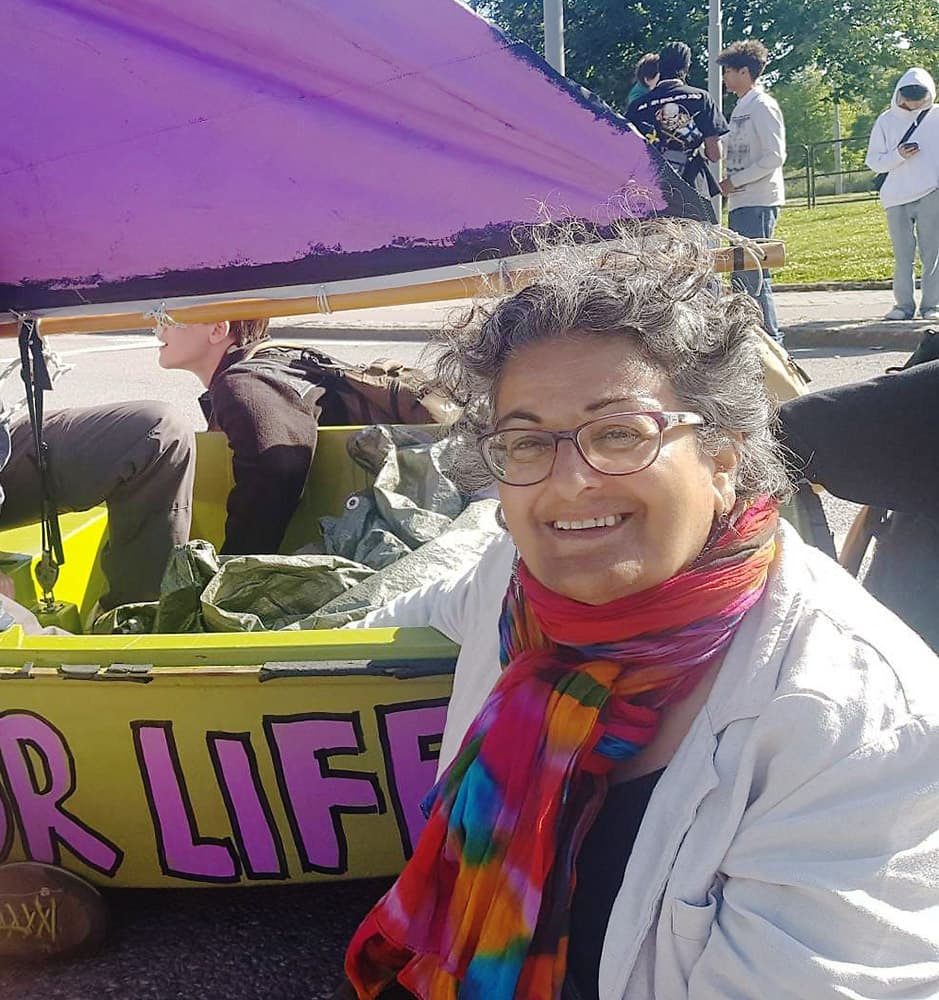 Sima, with her hand glued to a boat, during a blockade in Gothenburg.
Sima, with her hand glued to a boat, during a blockade in Gothenburg.
My name is Sima, and I am a rebel with a local XR group in Lund, in the south of Sweden. Before I became active in the climate movement, I was mainly interested in social and political issues. That is because of my background as a political activist in Iran, where I was born. After eight years of doing activism in Iran, I had to flee unjust persecution, which is when I came to Sweden.
In Sweden, I became a biologist and also got a PhD at the medical department of Lund University. After some years, I started working with Doctors Without Borders, which gave me the chance to work all around the world and make connections with all kinds of people. It is these human connections that make me determined to act for a more just world.
When I saw social issues worsening due to the escalation of the climate crisis, I decided to become a climate activist. It is clear to me that this climate crisis is caused by the capitalist system. Given the social injustices that have been embedded in the system since colonialism, and knowing the people whom this system works against, I could not accept just demonstrating. I wanted to take more radical action. That is why I was drawn to the civil disobedience methods of XR.
I do not worry about the consequences of taking part in civil disobedience actions because whatever happens, I have gone through worse in Iran. Of course, it is terrible that more and more peaceful activists here in Europe are facing persecution. But it is a very small price to pay given what is at stake for humanity if we don’t act.
Now that I am retired, I also feel that I am in a particularly privileged position. I have a stable source of income, my children are all grown up, and I have a lot of free time. So, I see it as my duty to take advantage of this privilege and take action. As an older person I also see it as my responsibility to the younger generations to secure a safe future, and in many places, a safe present for them.
I will always work on integrating social issues and climate issues in my activism. We will not be able to tackle the climate crisis without working on social issues too, especially now that so many democratic rights are being taken away in so many countries.
I really plead for broad collaborations and think XR should actively get involved with organisations that work on social issues. Society is complex and there are so many issues to be tackled and so many strategies to do it, no person or organisation can do that by themselves. We have to unite and work together.
If you know (or are) a rebel somewhere in the world with a story to tell, get in touch at [email protected]
Thank you
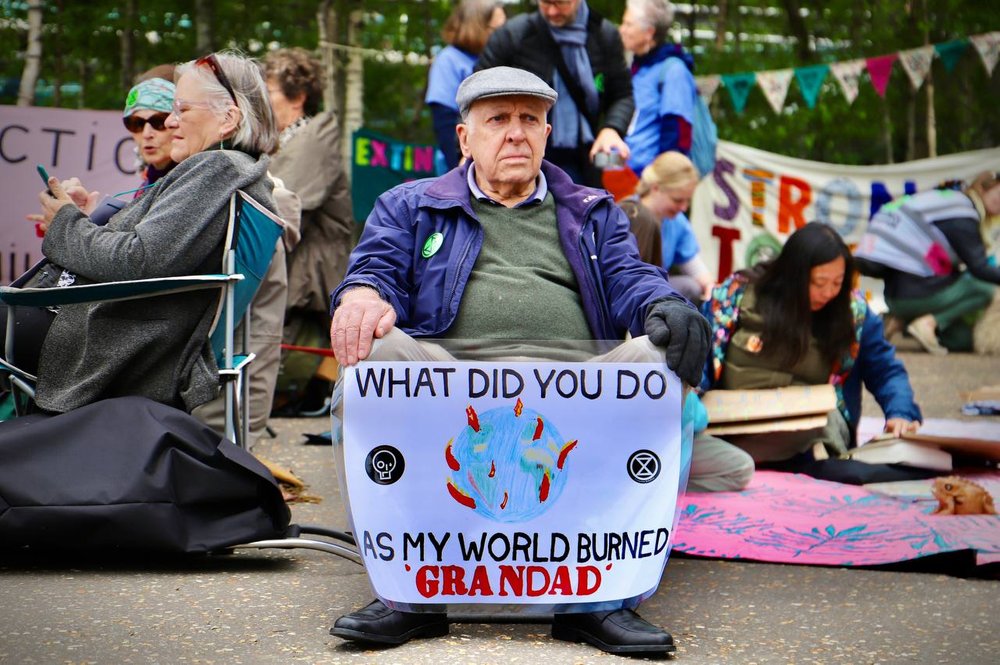 A rebel grandfather in London, UK joins the global Mothers* Rebellion.
A rebel grandfather in London, UK joins the global Mothers* Rebellion.
Thank you for reading, rebel. If you have any questions or feedback, we want to hear from you. Get in touch at [email protected].
For global events, trainings, & opportunities, visit XR Global Support Events.
Subscribe to the XR Global Newsletter.
Get involved in XR wherever you are! Check out our global website, learn more about our movement, and connect with rebels in your local area.
This newsletter is brought to you by XR Global Support, a worldwide network of rebels who help our movement grow. We need money to continue this crucial work.